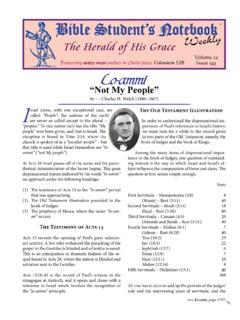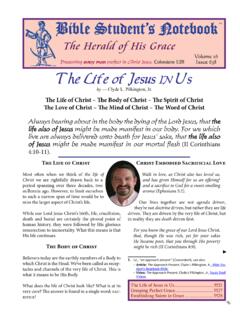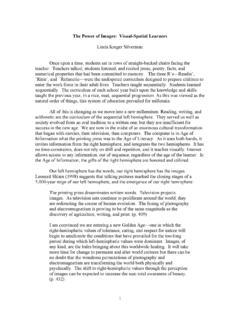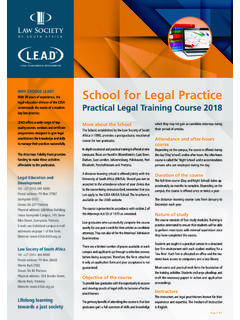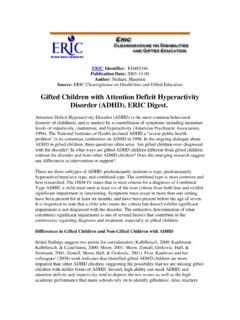Transcription of The Herald of His Grace - Bible Student's Notebook
1 The witness of Stephen was,.. you do always resist the Holy Spirit: as your fathers did, so do you. Which of the prophets have not your fathers persecuted? And they have slain them which showed before of the coming of the Just One; of Whom you have been now the betrayers and murderers (Acts 7:51-52.)Let us notice some facts recorded in Acts which ceased when the period of 33 years was over: a unique interval between the age-times, the special charac-ter of which has not been sufficiently as Christ was offered to Israel and was deliberately refused, being a stone of stumbling to both of the houses of Israel, so too was the offer made by the Holy Spirit, through Peter, that if there was a national repentance on the part of the Jews of Judaea and Israel in the Disper-sion, those times of refreshing would come, and God would send back the Lord Jesus Christ (Acts 3:19-21).
2 Bible student s Notebook The Herald of His GraceVolu m e 2 5 Issue 613 Presenting every man perfect in Christ Jesus. Colossians 1:28 The Acts of the Apostles and Paul s Acts Epistles, Considered Historically and Dispensationally ..5321 The Acts Period Dispensation (quote) ..5323 The Three Spheres - Distinguishing Between Them ..5324 Ephesians, Philippians and Colossians (quote) ..5326 Present Truth: The Present Secret Administration (quote) ..5326In the Four Gospels we have portrayed in plain and strikingly solemn language the rejection and crucifixion of the One Who was and is the true King of Israel, the true Servant and Prophet of Jeho-vah, the lowly and yet glorious Son of Man, and the One Who was and is the Son of the Living rejection is set forth in order, and by a num-ber of historical incidents, in the Synoptic Gospels; while, at the commencement of John s Gospel, we are told what the solemn and tragic result of His minis-try was: namely, that He came unto His own and His own received Him not (1:11).
3 In the Four Gospels the well-beloved Son of God came and tabernacled among Israel, but they hated both Him and the Father Who sent Him in love and , too, with the Book of the Acts of the Apostles, it is not only the coming of the Holy Spirit to Israel with the signs following, as in Joel, but we have the sol-emn record of the rejection of the Spirit and of the of-fer made with accompanying miraculous signs of the return (or the Parousia1) to introduce the Kingdom of the risen Christ, those times of refreshing which cannot come to Israel and the world generally so long as the blindness is upon the chosen earthly [Editor:] Strong s G3952 ( ), commonly translated coming, and found 24 times in the Greek Scriptures, never once in Paul s Prison Epistles in reference to Christ s return, or second Acts of the Apostles and Paul 's Acts EpistlesConsidered Historically and Dispensationallyby Coles Bible student s Notebook Po Box 265; WindBer, PA 159635322 Issue 613 Mark a momentous crisis; Judaism has now fallen!
4 A long dispensation here ends (Acts 28:25-29). W. Graham Scroggie (1877-1958) Stephen saw Him standing at the right hand of God (Acts 7:56). Not as yet had He sat down to wait until His enemies should be made His footstool (Hebrews 10:12-13).The sentence of national blindness, foretold in Isaiah 6, seven hundred years before this critical point in Is-rael s history, was impending over the favored Lord Himself had twice referred to this awful sen-tence of judicial blindness, but it was left to the Apos-tle Paul to follow in the steps of Isaiah and to say, Here am I, send me (to deliver this solemn message).When at Rome, as recorded in Acts 28, he addressed the Jews for the last time as a corporate body at the close of his ministry, as far as going to them in their synagogues was concerned; he quoted that o n e word that dreadful sentence of blindness which now for nearly two thousand years has darkened the eyes and hardened the hearts of that still-rebellious and unbelieving Apostle Paul had already warned them in the Synagogue of Antioch in Pisidia (Acts 13):Since you judge yourselves unworthy of age-last-ing life, lo, we turn to the Gentiles (:46).
5 It was then that they were being provoked to jealousy by them which were no people, and made angry by a foolish nation (Romans 10:19), who asked that they might on the following Jewish Sabbath have the privi-lege of hearing, for themselves, those good tidings of the proffered return of Christ, and of the coming of that time when it was foretold that not only would the tabernacle of David be restored, but the Gentiles also should share in the blessings: as it was written,Rejoice you Gentiles with His people (Deuter-onomy 32:19-21, 43). The prisoner of Christ Jesus for you Gentiles (Ephe-sians 3:1), after he had pronounced the sentence of blindness of Isaiah 6, was sustained in his prison at Rome, and he was soon afterward inspired to write the most profound of all of the sacred writings: the Epistles to the Ephesians, Philippians and Colos-sians, oracles of God which contain far deeper truth concerning Christ and the church,2 the Mystery hid-den during and from the age-times, to which there is no reference in the Acts of the transitional and unique period of time this untoward generation recorded in Acts (2.)
6 40), was concluded before the Epistles of the Captivity3 were written, and, so, when it is affirmed by some that the Church began at Pentecost, we must remember that Pentecost had its Jewish application first, as in Leviti-cus 23, and not allow this partial truth to carry with it a wrong must also bear in mind that Dispensation of the Secret hid in God (Ephesians 3:9) was not set forth until the age-times were over and the period cov-ered by the present interval of Grace began Christ, the Hope of Glory (Colossians 1:27).After the glorious translation as revealed in the Se-cret in Philippians 3:21, when these bodies of our hu-miliation will be transfigured into the likeness of the body of His Glory, then the broken-off events which commenced at Pentecost, with the miraculous signs and speaking with tongues, will again begin to run their course, to be followed by the remaining portion of the unfinished prophecy of Joel:And I will show signs in heaven above and in the earth beneath, blood and fire and pillars of smoke.
7 The sun shall be turned into darkness, and the moon into blood, before that great and terrible day of the Lord come. And it shall come to pass that whosoever shall call upon the Name of the Lord shall be delivered .. (2:30-32).First, however, the Secret revealed by Paul in Ephe-sians and Colossians must be preached among the Gentiles, believed on in the world, and received up into Glory (I Timothy 3:16).Again, the recognition of the peculiar and unique 2. [Editor:] The Greek word often translated as church in most English versions is (ekkle sia, or ecclesia). The word is a compound word meaning called-out (ek = out ; kaleq = called). The ecclesia is God s called-out ones. The ecclesia is not a building or denomination; not a meeting, or doctrinal creed; it is not somewhere we go, or something we do, it is who we as believers [Editor:] Also known as the Prison Epistles, Perfection Epistles, or Latter student s Notebook PO BOX 265; WINDBER, PA 15963 Issue 613 The disruption involved the slaying of the Lambkin (Revelation 13:8).
8 John H. Essex (1907-1991) nature of the 33-three year history recorded in Acts leads to a very important question as to the dispen-sational teaching and the chronological order of the Pauline earlier Epistles of Paul, written before the close of the historical period covered by the book of Acts, involved the Parousia, or return, and Kingdom of Christ, still being offered to Israel and the we not here an answer to the insinuation that Paul was mistaken in hoping that the Parousia might occur even while some of those who were then wait-ing for God s Son from heaven were still alive, and who might therefore be actually be preserved blame-less in spirit, soul and body (I Thessalonians 5:23) until the day of His then expected Parousia?So long as the offer of Christ s Parousia was being made, within those 33 years covered by Acts, of the possible immediate return of Christ, those earlier Epistles of Paul, written before that offer was defi-nitely and hopelessly refused by Israel (both in Ju-daea and in the Dispersion)
9 , and which contain special references to the Parousia, would be, in their scope, in accordance with the then distinct offer and dispensational dealing of is remarkable that it is only in these earlier Epistles of Paul, written before his imprisonment at Rome, and during the course of those 33 years covered by Acts, that the Parousia is word Parousia does not once occur in Ephesians or Colossians, and the translation referred to in Phi-lippians 3 is in connection with the On-High Call-ing and the Prize which was connected with the great Secret of Christ and the Church. This Secret purpose of God was not fully declared when the Par-ousia, immediately to precede the Kingdom, was the goal then offered to His faithful and beloved servant Paul, when in prison in Rome, God would yet more fully reveal this wondrous Glory of Christ as the future head of the Universe.
10 With the Church as His fullness (ple-roma4), a deeper and more exalted truth followed the rejection of the Parousia and the Kingdom of I Thes-salonians 4, which was now postponed the Secret, hidden in God, has been consum-mated and we are received up in Glory, the Parousia will surely come, notwithstanding its long postpone-ment; for none of God s words will fall to the ground. However, the Blessed Hope, as found in Philippians 3:21, I Timothy 1:1, 11 and Titus 2:13, will be ful-filled before that public Parousia will also be evident, when the foregoing historical aspect of the Book of Acts is recognized, that the mir-acles and powers of the world to come (Hebrews 6:5), which were so distinct a feature of that exceptional pe-riod, naturally ceased when the testimony of the Holy Spirit, which they were intended to emphasize, was finally rejected by Israel, as Christ Himself had pray now for a renewal of Pentecostal gifts while the Secret is still to be preached among the Gentiles, though doubtless with sincere intent, is surely not according to knowledge.
